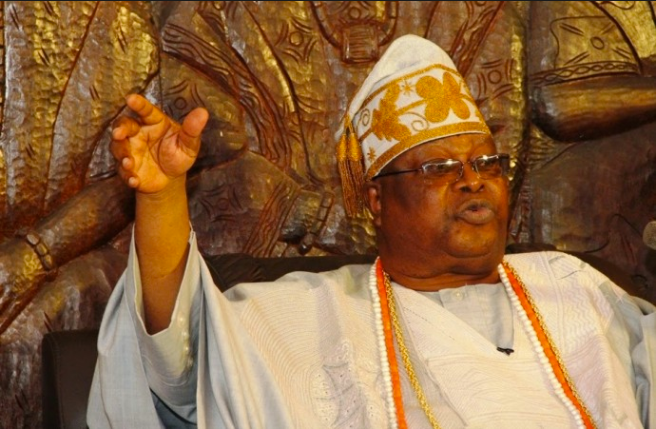🌿 Ruzu Non-Alcoholic Herbal Bitters
Ruzu Non-Alcoholic Herbal Bitters is a natural health supplement specially formulated to:
- ✅ Promote general wellness
- ✅ Detoxify the body
- ✅ Support the treatment of various ailments
Made from a powerful blend of 100% organic and medicinal herbs, Ruzu is completely alcohol-free, making it ideal for:
- 👪 All age groups
- 🌱 Health-conscious individuals
- 🌿 Anyone seeking non-alcoholic herbal remedies
Whether you're looking to boost your vitality, cleanse your system, or support healing the natural way, Ruzu Bitters offers a trusted herbal solution.
In 2025, Sunday, July 13, was a day to remember in Nigeria. Professor Wole Soyinka, the Nobel laureate, turned ninety-one on that day. However, regrettably, that was also the day that two friends—former President Muhammadu Buhari and Oba (Dr.) Sikiru Kayode Adetona, the Awujale of Ijebuland—paid back the elements.
Awujale Adetona was remarkable in a number of ways. His father, Prince Rufai Adeleke, was destined to be king, but he gave the throne to his son instead, who ruled the Ijebu kingdom for 65 years after ascending to the throne just one month before his 26th birthday.
In every aspect—his appearance, demeanor, mannerisms, and behavior—he was a member of royalty. He always believed in his own judgment, spoke the truth, and stood by his convictions. Not even the possibility of death could make him change his mind; he would never give up.
Following the brutal annulment of Nigeria’s most free and fair presidential election by the military administration of President Ibrahim Babangida, that much was demonstrated in a remarkable encounter with General Sani Abacha, the dictator who governed Nigeria with an iron grip.
Even though Bashorun MKO Abiola had won the election handily, Awujale Adetona was certain that giving him control of the government—even if it was only temporarily—was the only way to break the political impasse the military had created.
He organized secret, occasionally public gatherings of Abiola supporters, civil society activists, and opposition politicians at his palace in Ijebu Ode. Oba NADECO, or king of the National Democratic Coalition, was the moniker given to him as a result.
Awujale Adetona spoke out against the injustice in a clear and concise manner after General Abacha placed his deputy, Lieutenant General Oladipo Diya, in the gulag for a phantom coup and appeared determined to execute him and others.
One of his subjects, Ogun State Governor Bisi Onabanjo, determined to remove the Awujale in order to settle political scores during the Second Republic. But he firmly stood up, defended his rights, and refused to be persecuted for something he believed was unjustified.
Col. Oladipo Diya, the military governor of Ogun State, read the riot act to Ijebu Ode natives who had supported former governor Onabanjo, who was then imprisoned in Gen. Buhari’s gulag. Fortunately for him, Governor Onabanjo lost his seat to the coup that turned Major General Muhammadu Buhari into a military head of state.
Awujale Adetona successfully combined the modern and the ancient by introducing new concepts to perform duties and traditions from the past. He consistently demonstrated exceptional radical and progressive features throughout his public career.
Read Also: NNPC Pushes to Build African Refining Ecosystem and Reduce Import Dependency
He oversaw the construction of an ultramodern palace for his people and brought back and revived the Regberegbe age grade as part of the celebration of an Ojude Oba Carnival that was much better than the London Nothing Hill Carnival, the New Orleans Mardi Gras, and the Rio Carnival in Brazil.
To make room for more competitors, he was successful in convincing Segun Osoba, the former governor of Ogun State, to turn the old Public Works Department building across from the Aafin Awujale into the Ojude Oba Arena. But now, the arena is getting smaller in comparison to the enormous number of people at the Ojude Oba Carnival.
Three organizations were created by him out of the clique of Ijebu titleholders: the Council of Chiefs, for chiefs; the Council of Otunba, for Otunbas; and the Ijebu Traditional Council, for kings. He made several “Baales” into crowned kings in order to improve their communities’ standing.
But more significantly, he appointed people of outstanding caliber to those positions, even though he admitted that the relevant families should choose the candidates for family titles and attempted to advise them to do so.
However, others felt that he went too far when he almost eliminated various customs due to his Islamic faith: He ceased taking part in the dance that signaled the Alagemo priests’ entrance in Ijebu Ode for their celebration.
He allegedly ceased to provide the necessary resources for the yearly Obirin Ojowu Festival and its celebration. In Ijebu Ode, the Egungun Masquerades festival also became rare and almost extinct.
His ability to persuade Ogun State Governor Dapo Abiodun and the State House of Assembly to pass a law allowing Ogun State kings to be buried in accordance with their religious beliefs rather than by traditionalists who allegedly hack the bodies of deceased kings into pieces for ritual purposes was the pinnacle of his radical and progressive qualities.
We express our condolences to the people of Ijebu Ode on the passing of Awujale Sikiru Kayode Adetona, a unique and forward-thinking monarch who had a profoundly noteworthy influence on Yorubaland’s kingship system. In the color of the lately deceased, the issue today is, “Whence comest another Awujale?”
















